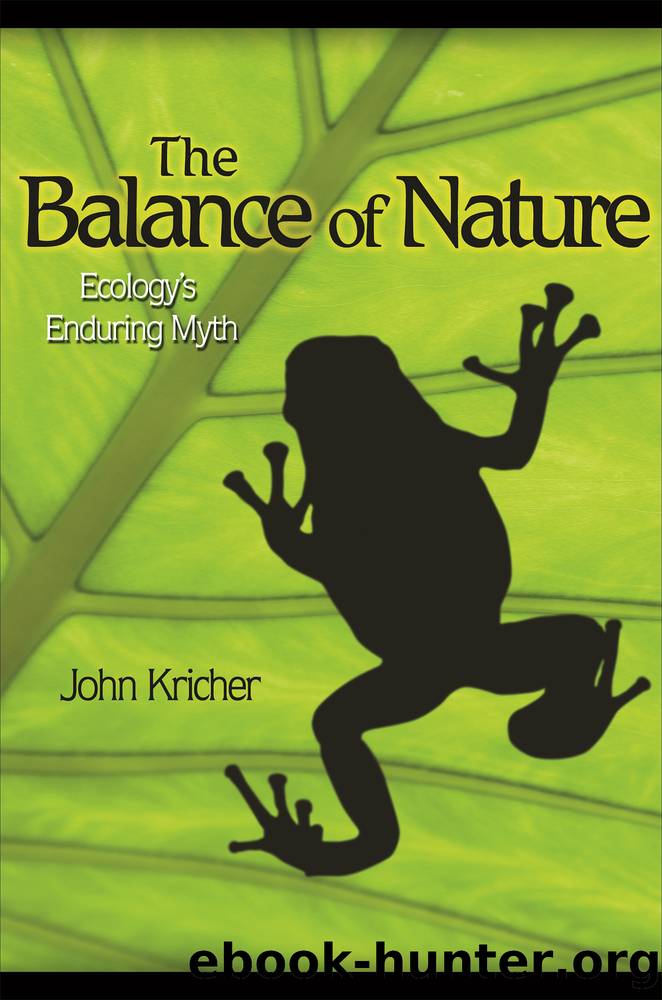The Balance of Nature by John C. Kricher;

Author:John C. Kricher;
Language: eng
Format: epub
Publisher: Princeton University Press
Published: 2022-06-15T00:00:00+00:00
10
Life Plays the Lottery
One obvious argument against the existence of a balance of nature, at least as such a balance implies purpose and teleology, is the reality of just plain luck. Good or bad, it doesnât matter. Especially when luck changes the world.
Luck is not a very scientific term but it comes close to one that is, the word âstochastic,â meaning nondeterministic. If evolution-altering events are stochastic in nature, then patterns of extinction and speciation (at least some of them, maybe many) may have little to do with anything other than âdumb luck.â This reality does not reduce the importance of natural selection. Indeed, natural selection is stimulated in such situations, as it is in such situations that new species evolve.
While I was writing this chapter the local television news reported that a convicted multiple sex offender had just won 15 million dollars in the Massachusetts State Lottery. The story, not surprisingly, focused on how intrinsically âunfairâ it is for someone who has committed vile acts against society to now reap an immense reward merely by purchasing a scratch ticket. Thatâs luck for you. Think of all the decent, deserving, law-abiding folks who bought lottery tickets in that game. And who won? The sex offender. There is, of course, no connection between oneâs social history, oneâs criminal record, and oneâs probability of winning a state lottery. Thanks to a small act, purchasing a lottery ticket, and unusually good luck in a fully stochastic game, Massachusetts now has a multimillionaire multiple sex offender.
The study of lifeâs history in deep time is illuminating. I think part of the reason why ecologists came so late to the recognition of the significance of temporal scale is that they work in the present, usually on short time scales (it takes about four years to earn a Ph.D.). Also, most of their models and underlying assumptions about ecosystem structure and function were until recently based on the presumption of attaining and maintaining equilibrium within ecosystems. Stochastic models were not common in my graduate training during the 1960s, though they certainly are now. That is why I am devoting this chapter to how evolution, and, of course, ecosystems, are changed by chance events (luck).
I lecture and teach about dinosaurs, and dinosaurs fascinate.1 The question I am asked more than any other about dinosaurs is, what killed them? The large dinosaurs that roamed Jurassic Park are long gone, a fact that has produced no shortage of suggestions as to why. A perusal of my many dinosaur books, some dating back over a half-century, shows the most frequent explanation to be âclimate change.â Details about just how climate changed are rarely supplied, though speculation, understandably, ranges from âtoo hotâ to âtoo coldâ for dinosaurs.
Extinction scenarios about dinosaurs suggest that paleontologists have occasionally let their imaginations run wild. One antiquated but popular idea was that of racial or, more accurately, species senility, the notion that evolution can only take a species so far and then it dies. Usually it is considered to have become âoverspecialized.
Download
This site does not store any files on its server. We only index and link to content provided by other sites. Please contact the content providers to delete copyright contents if any and email us, we'll remove relevant links or contents immediately.
| Anatomy | Animals |
| Bacteriology | Biochemistry |
| Bioelectricity | Bioinformatics |
| Biology | Biophysics |
| Biotechnology | Botany |
| Ecology | Genetics |
| Paleontology | Plants |
| Taxonomic Classification | Zoology |
Sapiens: A Brief History of Humankind by Yuval Noah Harari(14045)
The Tidewater Tales by John Barth(12461)
Mastermind: How to Think Like Sherlock Holmes by Maria Konnikova(7018)
Do No Harm Stories of Life, Death and Brain Surgery by Henry Marsh(6744)
The Thirst by Nesbo Jo(6559)
Why We Sleep: Unlocking the Power of Sleep and Dreams by Matthew Walker(6437)
Life 3.0: Being Human in the Age of Artificial Intelligence by Tegmark Max(5264)
Sapiens by Yuval Noah Harari(5173)
The Longevity Diet by Valter Longo(4911)
The Body: A Guide for Occupants by Bill Bryson(4692)
The Rules Do Not Apply by Ariel Levy(4623)
The Immortal Life of Henrietta Lacks by Rebecca Skloot(4328)
Why We Sleep by Matthew Walker(4240)
Animal Frequency by Melissa Alvarez(4233)
The Hacking of the American Mind by Robert H. Lustig(4158)
Yoga Anatomy by Kaminoff Leslie(4152)
All Creatures Great and Small by James Herriot(4068)
Double Down (Diary of a Wimpy Kid Book 11) by Jeff Kinney(4019)
Barron's AP Biology by Goldberg M.S. Deborah T(3988)
